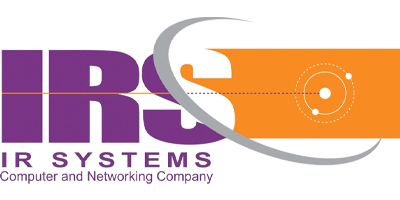QNAP NAS Storage: Top Backup & Network Solution
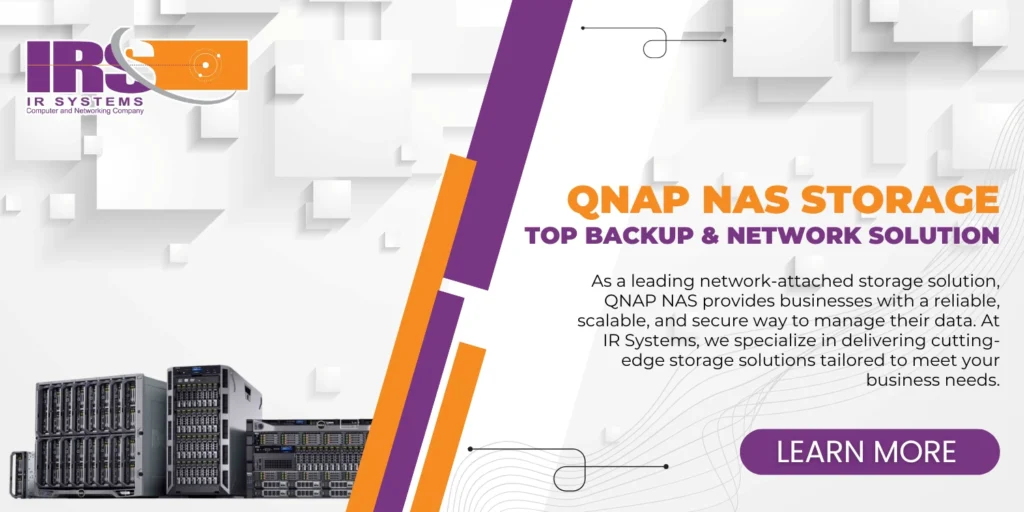
In today’s fast-paced digital world, businesses are generating and managing vast amounts of data daily. Ensuring this data is stored securely and accessible at all times is critical for operational efficiency and business continuity. This is where QNAP NAS Storage comes into play. As a leading network-attached storage solution, QNAP NAS provides businesses with a reliable, scalable, and secure way to manage their data. At IR Systems, we specialize in delivering cutting-edge storage solutions tailored to meet your business needs. In this blog, we’ll explore how this storage can transform your data management strategy, the importance of enterprise data security, and how our solutions can help your business grow continuously. Why Data Security is Crucial for Business Growth Data is the backbone of modern businesses. From customer information to financial records, losing access to critical data can lead to significant downtime and revenue loss. Enterprise data security ensures that your sensitive information is protected from cyber threats, hardware failures, and accidental deletions. With QNAP NAS Storage, businesses can achieve: Enhanced Data Protection: Advanced encryption and RAID configurations safeguard your data. Seamless Backup Solutions: Automated backups ensure your data is always recoverable. Scalable Storage: Easily expand storage capacity as your business grows. At IR Systems, we understand the challenges businesses face and beyond. That’s why we offer tailored backup solutions to help you stay ahead of potential data disasters. The Role of Network Storage in Modern Businesses Network storage, often referred to as Network-Attached Storage solution, is a centralized storage solution that allows multiple users and devices to access data simultaneously. It’s an essential component of any business’s IT infrastructure, providing: Centralized Data Management: Store and manage all your data in one place. Improved Collaboration: Enable teams to access and share files effortlessly. Cost-Effective Scalability: Add storage capacity without overhauling your entire system. QNAP NAS Storage excels in providing these benefits, making it a top choice for businesses looking to optimize their data management processes. How QNAP NAS Storage Enhances Backup Solutions Backup solutions are a critical aspect of any data management strategy. Without reliable backups, businesses risk losing valuable data due to hardware failures, cyber-attacks, or human error. It offers robust backup features, including: Automated Backups: Schedule regular backups to ensure data is always up-to-date. Hybrid Backup Sync: Combine local and cloud backups for added security. Disaster Recovery: Quickly restore data in case of emergencies. For businesses, our backup solutions are designed to provide peace of mind, knowing your data is secure and recoverable at all times. The Essential Guide to Enterprise Data Security and Continuous Business Growth Enterprise data security is more than just safeguarding information—it’s about creating a foundation for uninterrupted business growth. In today’s data-driven world, ensuring your data is secure, accessible, and compliant is critical for long-term success. Here’s how this Storage solution plays a pivotal role in supporting continuous business growth: 1. Data Accessibility: Empowering Your Team With this Storage, your team can access critical data anytime, anywhere. This seamless accessibility enhances productivity, enabling employees to collaborate effectively and make informed decisions without delays. Whether your team is in the office or working remotely, QNAP ensures your data is always within reach. 2. Compliance: Meeting Industry Standards Staying compliant with industry regulations is non-negotiable. This Storage offers advanced security features like encryption, user authentication, and audit logs, helping you meet stringent compliance requirements. This not only protects your business from legal risks but also builds trust with clients and stakeholders. 3. Cost Efficiency: Scalable and Sustainable Solutions Investing in scalable storage solutions like QNAP NAS allows you to reduce IT costs while accommodating growing data needs. Instead of overhauling your entire system, you can expand storage capacity as your business grows, ensuring cost-effective and sustainable operations. By partnering with IR Systems, you gain access to expert guidance and cutting-edge technology tailored to your business needs. Let us help you build a secure, efficient, and growth-oriented data management strategy. FAQs About QNAP NAS Storage What is QNAP NAS Storage? It is a network-attached storage solution that provides secure, scalable, and efficient data management for businesses. How does QNAP NAS ensure data security? QNAP NAS uses advanced encryption, RAID configurations, and automated backups to protect your data from threats and failures. Can QNAP NAS be customized for your business needs? Yes, QNAP NAS is highly customizable, allowing you to scale storage and features as your business grows. Why choose IR Systems for backup solutions in Lahore? We offer tailored solutions, expert support, and cutting-edge technology to ensure your data is always secure and accessible. Why Choose IR Systems for Your Storage Needs? At IR Systems, we are committed to helping businesses and beyond achieve their data management goals. Our expertise in QNAP NAS Storage and backup solutions ensures that your data is secure, accessible, and optimized for performance. Whether you’re looking to enhance data security, streamline operations, or support continuous business growth, we have the solutions you need. Visit us to learn more about how we can help your business thrive. By investing in QNAP NAS Storage and partnering with IR Systems, you’re not just securing your data—you’re paving the way for sustainable business growth. Contact us today and let us help you build a future-proof data management strategy.
Secure and Scalable NAS Storage Solutions
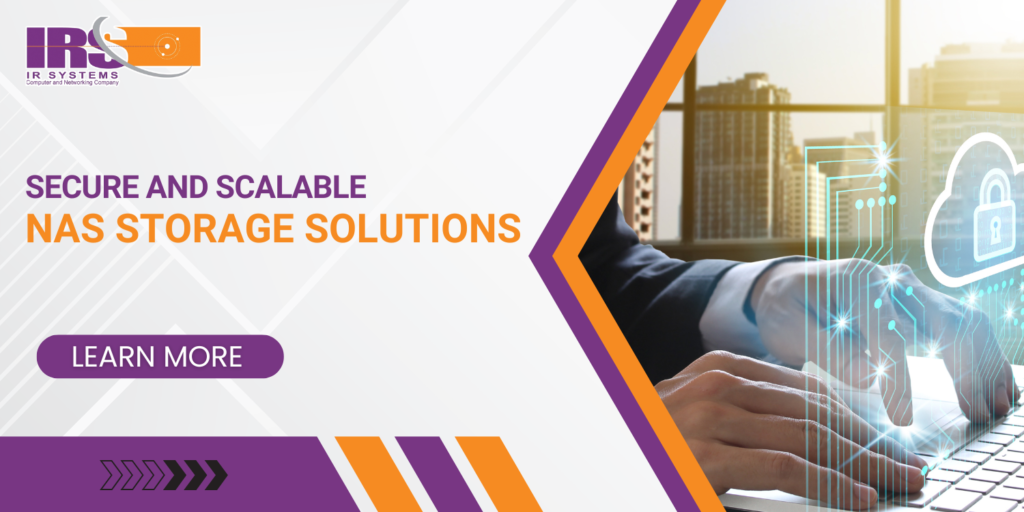
In today’s digital era, businesses rely heavily on efficient and secure data storage solutions to drive operations and safeguard valuable information. NAS Storage has emerged as a vital tool for companies aiming to streamline operations, ensure data security, and support continuous growth. Whether you’re a small business or a large enterprise, understanding the role and benefits of NAS (Network-Attached Storage) can transform the way you handle data. What is NAS Storage? NAS, or Network-Attached Storage, is a dedicated data storage device connected to a network that allows authorized users to store and retrieve data seamlessly. Unlike traditional storage solutions, NAS offers advanced features like: Centralized Data Management: Consolidates all your data in one place. High Scalability: Easily expandable as your storage needs grow. Enhanced Accessibility: Provides remote access to data anytime, anywhere. For businesses, NAS Storage provides a perfect solution to meet the increasing demands for data efficiency and security. Benefits of NAS Storage for Businesses 1. Seamless Backup Solutions One of the core advantages of NAS Storage is its capability to provide reliable Backup Solutions. It ensures your critical business data is protected against unforeseen circumstances such as hardware failures, cyber-attacks, or natural disasters. With automated backups and easy recovery options, NAS eliminates the risk of data loss. 2. Scalability to Meet Growing Needs As your business grows, so does your data. NAS Storage is designed to scale effortlessly, making it an ideal choice for enterprises of all sizes. You can add more storage capacity without disrupting existing workflows, ensuring uninterrupted operations. 3. Improved Collaboration and Efficiency NAS enables multiple users to access and share files simultaneously, fostering better collaboration within teams. With features like version control and secure file sharing, businesses can boost productivity and streamline operations. 4. Enhanced Data Security With cyber threats becoming increasingly prevalent, securing business data is non-negotiable. NAS Storage incorporates advanced security features like encryption, user access controls, and real-time monitoring to protect sensitive information. These features are invaluable for companies looking to safeguard their assets. How NAS Storage Supports Enterprise Data Security Centralized Data Management By consolidating all files in a centralized system, NAS simplifies data management while reducing the risk of data breaches. Administrators can monitor access, track changes, and ensure compliance with regulatory standards, contributing to robust enterprise data security. Backup and Disaster Recovery NAS devices are equipped with automated backup and disaster recovery features. Businesses can schedule regular backups to ensure data integrity and continuity, even during unexpected events. Integration with Existing Systems NAS Storage seamlessly integrates with existing IT infrastructure, allowing businesses to enhance data security without overhauling the IR SYSTEMS. Its compatibility with various software and hardware platforms ensures smooth operation. Why Choose NAS Storage? Businesses are increasingly turning to NAS solutions for their unmatched versatility and reliability. Here are some reasons why: Cost-Effective Solutions: NAS eliminates the need for multiple storage devices, reducing overall expenses. Flexibility: With remote access capabilities, employees can work from anywhere, enhancing operational flexibility. Customization: Tailored solutions cater to the specific needs of businesses across industries. At IR SYSTEMS, we offer state-of-the-art NAS Storage solutions designed to meet the unique requirements of businesses. Visit our website to learn more about how we can help secure your data and drive growth. NAS Storage vs. Traditional Storage Solutions Feature NAS Storage Traditional Storage Accessibility Remote and centralized Limited to local devices Scalability High Low Cost Cost-effective in the long run High maintenance costs Backup Capabilities Automated and efficient Manual and time-consuming Security Advanced encryption and control Basic protection mechanisms The Essential Guide to Enterprise Data Security and Continuous Business Growth Modern enterprises rely on robust data storage systems to secure sensitive information and support growth strategies. Here’s how NAS Storage aligns with these goals: Streamlined Workflows: With centralized data storage, employees can easily collaborate and share resources. Data Protection: Features like real-time backups and encryption safeguard critical business data. Cost Efficiency: Investing in scalable storage solutions reduces operational costs over time. Enhanced Decision-Making: Instant access to data enables informed business decisions, driving growth and success. FAQs About NAS Storage 1. What businesses benefit most from NAS Storage? NAS Storage is ideal for businesses of all sizes, especially those requiring secure, scalable, and cost-effective data management solutions. 2. How does NAS ensure data security? NAS devices offer features like encryption, user access controls, and real-time monitoring to protect sensitive data from cyber threats. 3. Can NAS Storage handle large-scale operations? Yes, NAS Storage is highly scalable and can accommodate growing data needs, making it suitable for large-scale operations. 4. Is NAS Storage cost-effective? Absolutely. By consolidating storage needs into one system, NAS reduces the need for multiple devices and lowers maintenance costs. 5. Where can you find reliable NAS Storage solutions? For reliable and advanced NAS Storage solutions. Final Thoughts: NAS Storage offers unparalleled advantages for businesses, from secure data management to enhanced collaboration and cost efficiency. By investing in this versatile solution, you can safeguard your business data, improve operational workflows, and support long-term growth. At IR SYSTEMS, we specialize in providing cutting-edge NAS Storage solutions tailored to meet your specific needs. Let us help you unlock the full potential of your business. For more information or assistance, don’t hesitate to Contact Us today and get started!
Boost Your Business with SAN & NAS Storage
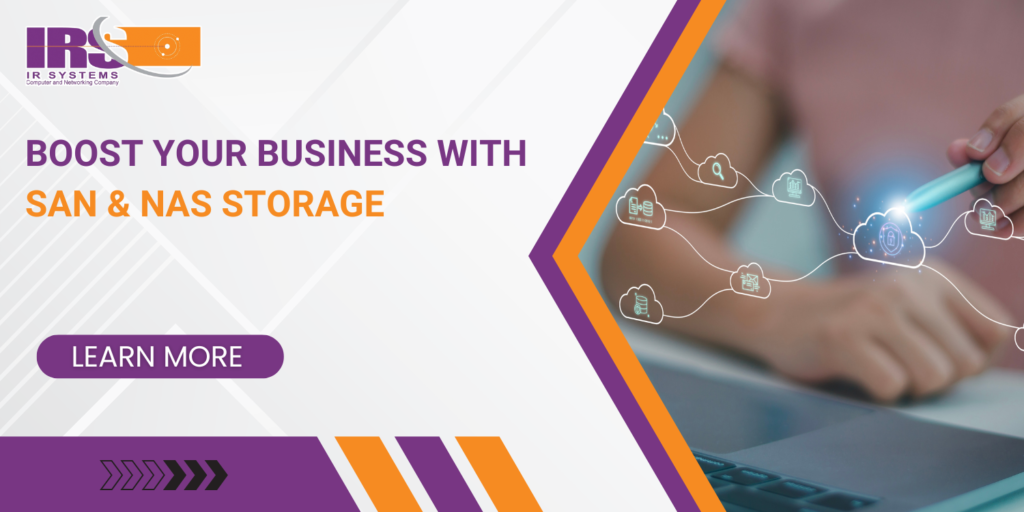
In today’s data-driven world, businesses require reliable storage solutions to manage large volumes of information efficiently. Two commonly used storage options are Storage Area Network (SAN) and Network Attached Storage (NAS). This guide will help you compare SAN Storage in Lahore with QNAP NAS Storage and Asustor NAS Storage to make an informed decision for your business. Let’s dive into the details and explore how each storage solution performs in terms of speed, scalability, cost-effectiveness, and backup capabilities. Understanding SAN Storage SAN Storage is a high-speed network-based solution designed for organizations with substantial data storage needs. It connects multiple storage devices to servers, creating a centralized storage system that ensures fast and secure data access across various devices. Key Features of SAN Storage High-Speed Performance: Ideal for businesses handling large datasets that require rapid data access. Centralized Management: Provides a single control point, simplifying storage management. Data Redundancy: Includes built-in backup features to protect against data loss. Scalability: Easily expandable to meet growing business data demands. Benefits of SAN Storage in Lahore Businesses in Lahore can benefit from SAN Storage by leveraging its robust performance for tasks like database management, virtualization, and high-demand applications. What is NAS Storage? NAS Storage connects directly to a Local Area Network (LAN) and provides file-based storage for multiple users. Unlike SAN, which requires a dedicated network, NAS systems are more straightforward to set up and manage, making them suitable for small to medium-sized businesses. Key Features of NAS Storage Cost-Effective Solution: Generally more affordable than SAN systems. Easy Installation: User-friendly setup, ideal for businesses with limited IT support. File Sharing Capabilities: Allows multiple users to access files over a network. Good for Small Data Volumes: Suitable for businesses with moderate storage needs. Comparing SAN Storage and NAS Storage Here’s a side-by-side comparison to help you understand the differences between SAN and NAS storage solutions: Feature SAN Storage NAS Storage Performance High-speed, ideal for large datasets Moderate speed, suitable for file sharing Cost Higher initial investment More affordable Scalability Highly scalable Limited scalability Installation Complexity Requires IT expertise Easy to set up and manage Use Case Large enterprises Small to medium businesses When Should You Choose SAN Storage? Choosing the right storage solution depends on your business needs. SAN storage is a suitable choice when: High Performance is a Priority: Businesses that require fast data transfer and low latency benefit from SAN’s dedicated high-speed network. Centralized Data Management: If your organization deals with complex data structures, SAN offers a centralized storage system to streamline data access. Backup Solutions: SAN storage supports efficient backup and recovery options, ensuring data protection. At IR Systems, we provide SAN Storage with integrated backup solutions to safeguard your critical business data. How Does SAN Storage Support Backup Solutions? Data loss can have significant consequences for any business. SAN Storage provides robust backup options to ensure data redundancy and minimize downtime in case of system failure. By implementing SAN Storage, businesses in Lahore can secure their data and maintain business continuity. When Should You Choose NAS Storage? NAS Storage is an excellent choice for businesses with more straightforward data needs. Consider NAS when: Affordability is a Concern: For startups and small businesses, NAS offers an economical solution. Simple File Sharing is Needed: NAS systems are perfect for collaborative work environments where file sharing is essential. Limited IT Resources: NAS systems are easy to install and manage, making them a hassle-free option for businesses without dedicated IT staff. Exploring QNAP NAS Storage QNAP NAS Storage is a popular choice for businesses looking for reliable, affordable storage solutions. These devices offer advanced features like remote access, data encryption, and efficient file sharing capabilities, making them suitable for small to medium enterprises. Key Benefits of QNAP NAS Storage Affordable Backup Solutions: QNAP NAS Storage devices offer built-in backup tools to secure your business data. User-Friendly Interface: Easy to set up and manage without extensive technical knowledge. Remote Access: Access your files securely from anywhere, improving business flexibility. Exploring Asustor NAS Storage Asustor NAS Storage offers high-performance solutions for businesses seeking reliable network-attached storage. Known for their versatility and scalability, Asustor devices are suitable for various business environments. Key Benefits of Asustor NAS Storage Data Protection: Features backup and recovery options to prevent data loss. High Scalability: Easily expand your storage capacity as your business grows. Energy Efficient: Designed to reduce power consumption while maintaining performance. Advantages and Disadvantages of SAN and NAS Storage Advantages of SAN Storage High-Speed Performance: Ideal for data-intensive applications. Centralized Management: Simplifies data organization and security. Data Redundancy: Ensures data protection through backup features. Disadvantages of SAN Storage Higher Cost: Requires a significant initial investment. Complex Setup: Needs skilled IT professionals for installation and maintenance. Advantages of NAS Storage Affordable Solution: Lower initial cost and maintenance expenses. Ease of Use: User-friendly setup and management. File Sharing: Suitable for collaborative work environments. Disadvantages of NAS Storage Limited Scalability: Expanding NAS storage can be challenging. Lower Performance: May not meet the demands of data-heavy applications. FAQs About SAN and NAS Storage What is the primary difference between SAN and NAS storage? SAN operates on a dedicated high-speed network, while NAS connects to a LAN and focuses on file sharing. Which storage solution is more cost-effective? NAS is generally more affordable, while SAN offers long-term ROI for large enterprises. Can businesses use both SAN and NAS storage? Yes, many businesses opt for a hybrid solution to enjoy the benefits of both storage types. How does SAN storage support backup solutions? SAN systems include integrated backup features to ensure data redundancy and quick recovery. Is Asustor NAS Storage a good choice for small businesses? Yes, Asustor NAS Storage offers scalable, energy-efficient, and secure storage options for small businesses. Choosing the Right Storage Solution for Your Business Selecting between SAN and NAS Storage depends on your specific business requirements. For high-speed performance, centralized management, and advanced backup solutions, SAN Storage is ideal for large enterprises. Meanwhile, QNAP NAS Storage and Asustor NAS Storage
Efficient NAS Storage Solutions for Business Data
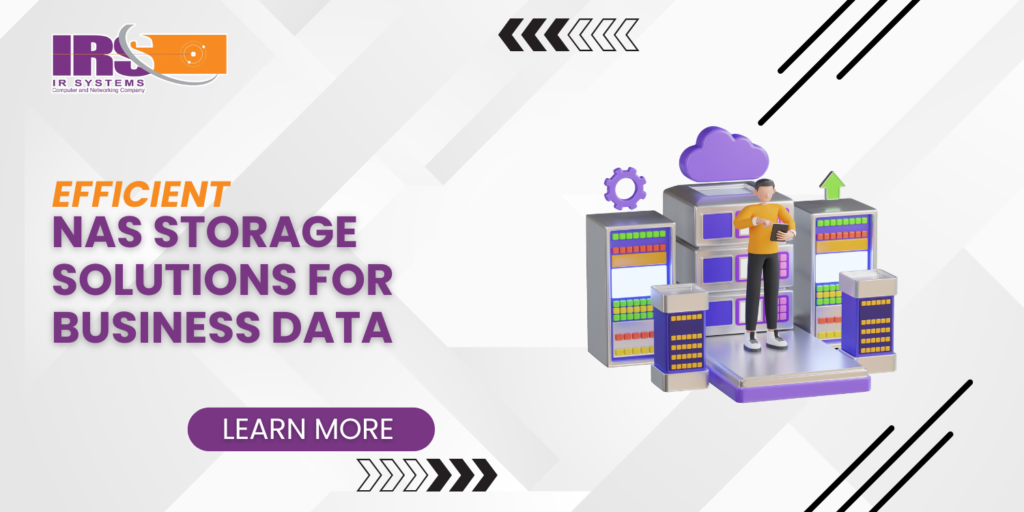
Network-Attached Storage (NAS) solutions provide an efficient way for businesses to store, manage, and access data. Unlike traditional storage solutions, NAS Storage offers a centralized location for storing data, which enables multiple users and devices to access the information they need. With the right NAS system, businesses can enhance data accessibility and optimize backup solutions to improve workflow and minimize downtime. In this article, we’ll cover the benefits of NAS Storage, explore its role in backup solutions, and discuss how it differs from network storage options. Let’s dive into why NAS might be the right solution for your business. Why Choose NAS Storage? NAS Storage brings various benefits, especially for organizations that need reliable and scalable data storage. Here are some of the main advantages: Centralized Data Access: NAS Storage allows you to centralize your data in one location, ensuring easy access for employees across the network. Enhanced Data Security: With NAS solutions, businesses can implement security measures, from user authentication to data encryption. Scalability: NAS devices are designed for flexibility, enabling businesses to add more storage capacity as they grow. Backup Efficiency: Many NAS solutions come with built-in features that support automated and scheduled backups, a significant asset in Backup Solutions. Understanding NAS: How It Works NAS Storage operates as a file-level data storage server connected to a computer network, allowing users to access files easily. This differs from Direct Attached Storage (DAS), where storage is tied to a single computer. NAS Storage is accessed via the network, making it a cost-effective solution for sharing files across multiple devices in an organization. Some key features include: File Sharing and Accessibility: NAS systems enable team members to access and share data seamlessly. Data Synchronization: Synchronize data across devices to ensure everyone in the organization is on the same page. Remote Access: Many NAS solutions offer remote access, which is invaluable for employees working offsite. Backup Solutions: How NAS Enhances Data Protection For companies looking for robust backup solutions, NAS systems offer a dependable option. Here’s how NAS supports efficient backups: Automated Backups: NAS solutions can schedule backups automatically, saving time and reducing human error. Version Control: Many NAS systems allow for versioned backups, meaning you can revert to previous versions of files if needed. Data Recovery: NAS systems often include features that simplify data recovery in case of accidental deletion or system failures. Cloud Integration: Some NAS solutions integrate with cloud services, enabling a hybrid approach to backups for extra security. By utilizing NAS for backup solutions, businesses can ensure their data remains safe, accessible, and up-to-date. For more information on choosing the right NAS system for backups, check out our website or contact our team to help you find the right storage solution for your business. Network Storage vs. NAS Storage: Key Differences While NAS is one form of network storage, it’s essential to understand how it differs from other network-based storage solutions. Here’s a quick comparison: NAS Storage: Primarily focused on file-level storage. Easy to set up and manage within a small or medium business environment. Ideal for businesses needing file sharing and backup capabilities. SAN (Storage Area Network): Provides block-level storage, often used for databases or high-performance applications. Typically more complex and requires a dedicated network infrastructure. Suited for enterprises with high-speed, high-availability requirements. Which to Choose? NAS Storage is often the right choice for businesses seeking an affordable, user-friendly solution for data storage, while SAN might be more appropriate for larger enterprises with complex storage needs. How NAS Storage Supports Business Growth NAS Storage not only enhances current operations but also supports business scalability. Here’s how: Cost-Effective Scaling: As your storage needs grow, NAS allows you to add more drives or even additional NAS units. Improved Collaboration: With centralized storage, employees can collaborate more effectively, accessing shared files without delay. Business Continuity: NAS devices with failover capabilities ensure that your data remains available, even in case of hardware failure. Implementing NAS Storage in Your Business When implementing NAS Storage, consider the following steps to ensure it meets your requirements: Assess Your Storage Needs: Identify your current and future storage demands. Choose the Right NAS Device: Select a device based on capacity, security features, and backup capabilities. Set Up User Permissions: NAS devices often allow you to assign user-specific permissions, keeping sensitive data secure. Establish a Backup Routine: Use the backup features in your NAS to create regular data backups. Benefits of NAS for Small and Medium Businesses NAS Storage offers specific benefits for small and medium-sized businesses (SMBs): Reduced IT Costs: With NAS, there’s no need for complex IT infrastructure, making it a budget-friendly solution. Enhanced Productivity: Teams can access data quickly, improving workflow efficiency. Streamlined Data Management: Managing data across departments becomes easier with a central storage system. For SMBs, the investment in NAS Storage is small compared to the convenience and data accessibility it provides. FAQs Q1. How does NAS Storage differ from cloud storage? A1: NAS Storage stores data on physical hardware within your network, while cloud storage keeps data on remote servers accessed over the internet. NAS offers faster access in-office, while cloud storage enables easy offsite access. Q2. Can NAS Storage help with data recovery? A2: Yes, many NAS systems offer data recovery tools, including version control and redundancy features, helping businesses recover data in case of accidental deletion or hardware failure. Q3. Is NAS Storage scalable? A3: Absolutely. Most NAS devices allow for storage expansion, making it simple to increase capacity as your business grows. Final Thoughts: As data management demands continue to grow, NAS Storage offers an ideal solution for businesses seeking reliability, scalability, and accessibility. With benefits such as centralized data access, robust security features, and backup automation, NAS Storage supports your business’s data needs while simplifying IT management. Whether you’re a small business looking to streamline file sharing or a growing company in need of enhanced backup solutions, NAS Storage is a flexible and cost-effective option. Ready to explore NAS Storage? Visit our website to find the
SAN Storage System: High Performance & Growth
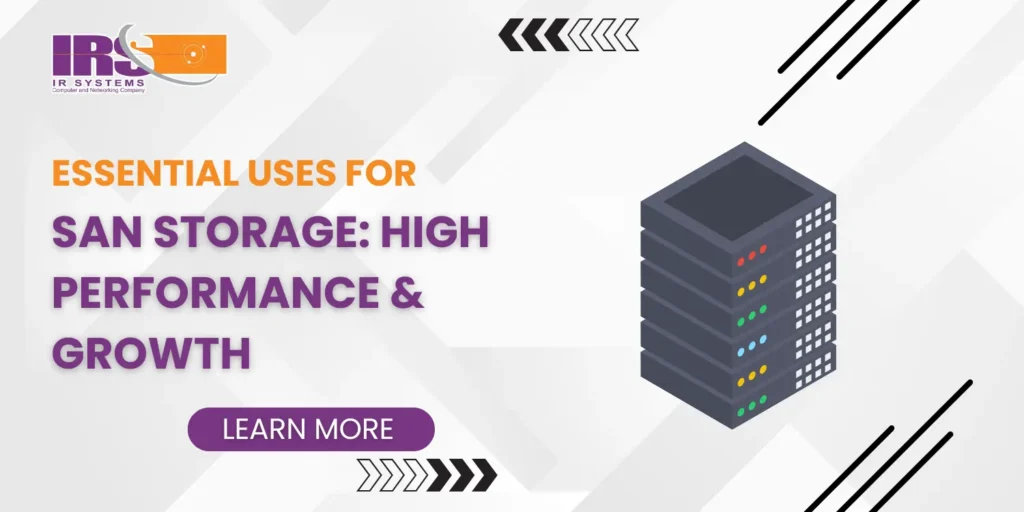
As data needs continue to expand, businesses face the challenge of finding efficient, scalable storage solutions. SAN Storage has become a sought-after option for organizations that require fast, reliable, and scalable data access. In this article, we’ll delve into when SAN should be used, how it stands apart from other storage solutions, and why it’s a valuable investment for businesses looking to streamline data management. We’ll also cover related services, such as backup solutions, and highlight QSAN XS 3316 for its remarkable features. What is SAN Storage? Storage Area Network (SAN) is a high-speed network of storage devices accessible to multiple servers. Unlike other storage options, SAN Storage offers dedicated resources for critical data, making it a prime choice for enterprises with high demands on storage performance, flexibility, and security. When to Consider SAN Storage for your business Are you wondering if this is the right time for choosing SAN Storage for your business? Here are some scenarios when SAN is especially beneficial: 1. High-Performance Requirements SAN is ideal for businesses needing high-performance storage. Its architecture supports quick access to large data volumes, making it suitable for applications where speed and reliability are essential. 2. Large Data Management For industries managing massive datasets like healthcare, finance, and media, SAN offers the necessary scalability. With SAN, expanding storage capacity doesn’t compromise performance, and data growth can be accommodated with ease. 3. Centralized Backup Solutions SAN is highly compatible with centralized backup solutions. By using SAN, businesses can back up all data centrally, reducing the risk of data loss and ensuring consistent data protection across departments. 4. Applications Requiring High Availability SAN provides redundant paths to data, ensuring high availability. If one part of the system fails, other paths can quickly pick up the load, providing a continuous service that keeps critical applications running smoothly. 5. Virtualized Environments For businesses running virtualized environments, SAN is an excellent choice. Virtualization puts high demand on storage systems, and SAN can manage these demands, providing reliable and scalable storage solutions for virtual machines. Key Benefits of SAN Storage You can explore our SAN storage system options at IR Systems, it has numerous key benefits, making it highly sought after by businesses of all sizes: Data Security and Reliability: With SAN, data is stored in a highly secure network, reducing the chances of unauthorized access or accidental deletion. Scalability: SAN systems can scale alongside your business, so you won’t need to worry about frequent upgrades or limitations on capacity. Efficient Backup Solutions: SAN systems are designed to work seamlessly with backup software, simplifying the data backup process. Exploring Backup Solutions Data loss can be catastrophic for any business, making effective Backup Solutions an essential part for any business. With SAN, organizations can streamline the backup process through centralized storage. Backup data can be easily transferred to secure storage, ensuring data integrity even in case of system failure. By integrating a Backup Solution with SAN, businesses can better protect their critical data assets, reducing the risk of data loss and improving recovery time. QSAN XS 3316: A Noteworthy SAN Storage Solution When looking for advanced SAN solutions, the Qsan XS 3316 is a standout. This model offers: High Availability: Redundant power supplies and dual controllers prevent system failure. Scalability: Designed for expansion, the Qsan XS 3316 accommodates future growth without performance loss. Easy Management: With intuitive management features, this model is ideal for businesses needing efficient data access and control. For companies considering SAN Storage, Qsan XS 3316 provides an optimal mix of speed, scalability, and security. Learn more about this solution on the IR SYSTEM website. SAN vs. Other Storage Solutions: A Brief Comparison Here’s a comparison to illustrate why SAN might be the ideal choice for specific business needs: Feature SAN Storage NAS Storage DAS Storage Best for High-speed, centralized storage File storage, home use Individual device storage Performance High Moderate High Scalability High Moderate Limited Data Access Block-level, fast File-level, moderate Direct connection Applications Mission-critical, virtualized environments Small businesses, departments Personal use, small businesses For high-performance and scalability needs, SAN outshines other storage types, especially in enterprise settings where data is critical. Frequently Asked Questions (FAQs) What makes SAN different from NAS? SAN operates on a block-level system, which makes data access faster compared to NAS. SAN is better suited for applications requiring high-speed data transfers. Is SAN Storage scalable? Yes, SAN is highly scalable. It allows for the addition of storage capacity without affecting system performance. How does SAN improve backup efficiency? SAN facilitates centralized data storage, which makes data backup faster and more streamlined, reducing the risk of data loss. Is SAN a good choice for virtualized environments? Absolutely. SAN Storage is ideal for virtualized environments due to its ability to handle high storage demands and provide uninterrupted data access. Final Thoughts: In today’s data-driven world, having a reliable storage solution is essential. SAN Storage is an optimal choice for businesses that prioritize high performance, scalability, and data security. With products like the Qsan XS 3316 and integrated Backup Solutions, your organization can stay prepared for future growth and data demands. IR SYSTEM offers the latest in SAN technology, making it easier for businesses to adopt secure, efficient, and scalable storage. Discover how our solutions can elevate your data management by contacting us today. Let us support your business growth with customized SAN solutions tailored to your needs.
Compare SAN and NAS Storage Solutions for Your Business
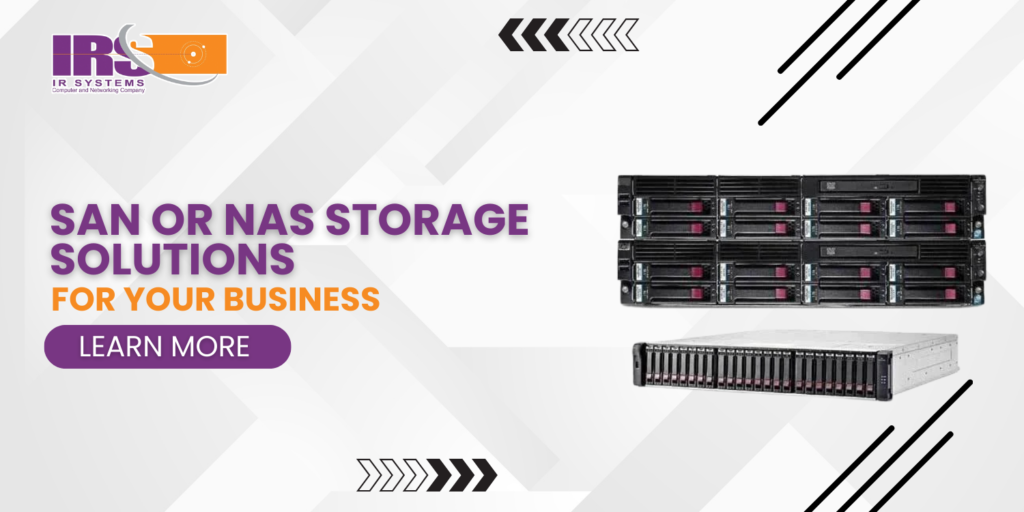
In today’s digital landscape, businesses of all sizes rely on robust data storage solutions to manage vast amounts of information securely and efficiently. Two of the most popular storage solutions are Storage Area Network (SAN) and Network Attached Storage (NAS). In this guide, we’ll delve into the specifics of SAN Storage and NAS Storage, comparing their features, benefits, and use cases to help you make an informed choice for your business. Let’s explore how each storage solution stacks up in terms of scalability, performance, cost, and ease of management. What is SAN Storage? SAN Storage refers to a network-based storage solution, typically used by organizations with extensive data storage needs. SAN uses a high-speed network to connect storage devices, enabling efficient and secure access to data across different servers. This setup provides a centralized storage system, often preferred by large businesses for its speed, reliability, and flexibility in handling massive data volumes. Key Features of SAN Storage High-Speed Performance: SAN is designed for rapid data transfer, ideal for businesses requiring quick access to large datasets. Centralized Management: With a single point of control, managing storage becomes more straightforward. Reliability and Redundancy: SAN systems often include features like mirroring and backup, ensuring minimal downtime and data protection. Scalability: Businesses can expand SAN systems as their data needs grow without disrupting operations. What is NAS Storage? Network Attached Storage (NAS) is another popular solution, especially suitable for smaller-scale storage needs. Unlike SAN, NAS connects directly to the local area network (LAN) and allows multiple devices to access files over the network. While NAS may not offer the same speed as SAN, it’s more affordable and easy to set up, making it a viable option for smaller businesses or home office setups. Key Features of NAS Storage Cost-Effective: NAS is generally less expensive than SAN and requires fewer resources. Ease of Use: Easy to install and manage, NAS systems are user-friendly for businesses with limited IT support. Data Sharing: NAS enables file sharing across multiple devices, ideal for collaborative work environments. Good for Small Data Volumes: While it lacks the high-speed performance of SAN, NAS handles moderate data volumes efficiently. SAN Storage VS NAS Storage: Key Differences Here’s a breakdown of the main differences between SAN Storage and NAS storage: Feature SAN Storage NAS Storage Performance High-speed, ideal for large datasets Moderate speed, suitable for file sharing Cost Higher initial cost with long-term ROI Lower cost, suitable for smaller budgets Scalability Highly scalable for growing data needs Limited scalability Installation Complexity Requires IT expertise and setup Easy to install and manage Best Use Case Enterprises with large data centers Small to medium businesses or home use When to Choose SAN Storage for Business Choosing the right storage solution depends on the scale and nature of your business. SAN storage is ideal for businesses requiring: High Performance and Low Latency: If your applications demand high data transfer rates and low latency, SAN storage delivers this through dedicated, high-speed networking. Centralized Data Management: SAN provides a robust solution for centralized data storage, making it ideal for businesses with complex data structures. Backup Solutions: Many organizations using SAN benefit from integrated backup features, providing efficient data recovery options. How SAN Storage Supports Backup Solutions In a competitive business environment, data loss can have severe repercussions. SAN storage is not only about efficient data access but also robust Backup Solutions. With SAN, businesses can set up dedicated backup systems that ensure data redundancy, minimizing the risk of data loss. At IR Systems, we offer SAN Storage that includes top-tier backup options tailored to safeguard your business data. Advantages and Disadvantages of SAN and NAS Storage Advantages of SAN Storage High Performance: Meets the demands of data-intensive applications. Centralized Control: Offers centralized data management, improving organization and security. Data Protection: Provides redundancy options and efficient Backup Solutions. Disadvantages of SAN Storage Cost: Higher setup costs may deter smaller businesses. Complexity: Requires skilled IT resources for installation and management. Advantages of NAS Storage Affordability: Lower initial investment and maintenance costs. Easy Management: Simple setup without extensive IT support. Disadvantages of NAS Storage Limited Scalability: Expanding NAS systems can be challenging for larger data volumes. Lower Performance: May not meet the demands of applications needing high data transfer speeds. Asustor NAS Storage: For businesses exploring NAS options, Asustor NAS Storage is a robust solution. Asustor NAS devices offer high-performance capabilities, affordable options, and a user-friendly interface. These systems support backup solutions, ensuring that businesses have access to efficient data recovery and protection options. Asustor NAS storage offers valuable features for data sharing and is an ideal choice for small to medium-sized businesses looking to streamline their storage without the complexities of SAN. FAQs About SAN and NAS Storage What are the main differences between SAN and NAS storage? SAN storage operates over a high-speed network, offering centralized storage for large datasets. NAS, however, connects directly to a LAN and is more suitable for file sharing in small to medium environments. Which is more cost-effective, SAN or NAS storage? NAS storage is typically more cost-effective, while SAN requires a higher initial investment. SAN’s long-term ROI can be beneficial for large businesses, while NAS is ideal for smaller budgets. Can you use both SAN and NAS in a single setup? Yes, many businesses implement both SAN and NAS for a hybrid solution, allowing them to benefit from the high performance of SAN and the accessibility of NAS for less data-intensive tasks. How does SAN storage support backup solutions? SAN storage often integrates backup solutions, enabling businesses to maintain data redundancy and recover data in case of system failure. Is Asustor NAS storage a good choice for small businesses? Yes, Asustor NAS storage provides affordable, user-friendly options, making it a reliable choice for small businesses needing efficient data management. Choosing the Right Storage Solution for Your Business Selecting between SAN and NAS depends on your business’s unique needs. For high-speed performance, centralized data management, and advanced backup solutions, SAN Storage is an
Advanced Backup Solutions – Enhance Data Security with NAS
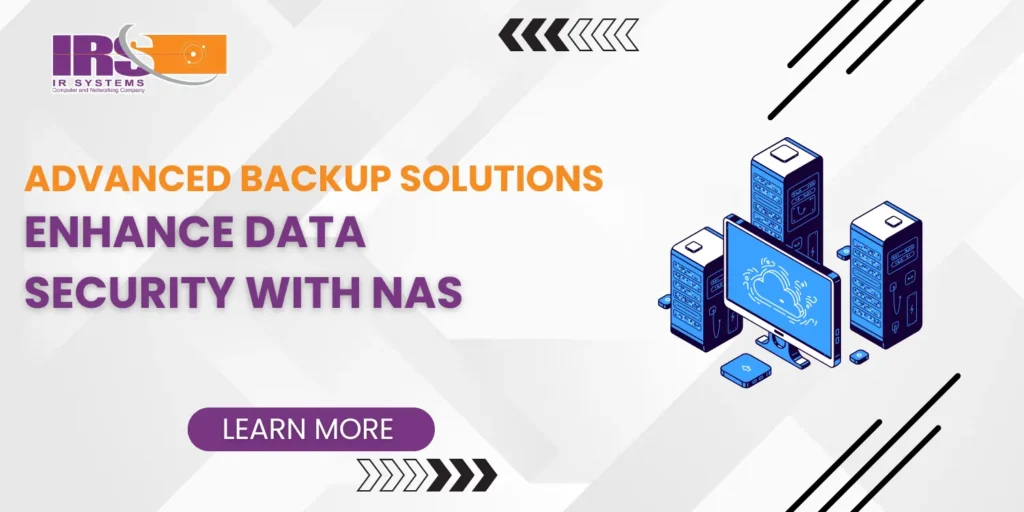
In today’s fast-paced digital world, data storage is crucial, and reliable backup solutions are more essential than ever. Backup storage solutions, like Network Attached Storage , play a pivotal role in ensuring the safety and accessibility of your data, whether for personal or business needs. A robust backup data storage protects against unexpected data loss from cyber threats, accidental deletions, or hardware failures, giving you peace of mind. Here’s what you need to know about the key types of backup storage solutions and why Network Attached Storage (NAS) is a popular choice for modern data management. Why Backup Storage Solutions are Essential Data loss can be devastating, especially when it involves sensitive or irreplaceable information. Backup storage solutions provide the safety net that every individual and organization needs to protect critical data. Here are a few of the main benefits: Protection Against Cyber Threats: With increasing cyber threats, a secure backup ensures data can be recovered if compromised. Preventing Data Loss from Hardware Failures: Hardware malfunctions can result in lost files; a reliable backup can help restore these without hassle. Access to Historical Data: Sometimes, having old versions of files or documents is necessary. Backup solutions retain versions for future access. Exploring Network Attached Storage (NAS) Network Attached Storage is becoming increasingly popular among local businesses and individuals. NAS offers a centralized platform to store, share, and back up data. Unlike traditional hard drives, NAS devices connect to your network, allowing multiple users to access files from different devices simultaneously. This storage solution is ideal for those looking for a streamlined way to manage and protect data. Top Advantages of Network Attached Storage (NAS) for Your Business Easy Accessibility: NAS allows users to access data from anywhere with an internet connection, making it an ideal solution for remote or hybrid workplaces. Data Security: Many NAS systems come with built-in security features, such as encryption and user authentication, to keep files safe. Scalability: NAS storage solutions are often scalable, allowing businesses to expand storage capacity as needed without overhauling the system. Types of Backup Storage Solutions A variety of backup storage solutions are available, each suited to different needs. Here are some of the most common options used by businesses and individuals today: 1. Cloud Backup Cloud storage is a popular choice because of its convenience and flexibility. By uploading files to a secure cloud server, users can access them from anywhere. Cloud backup solutions typically come with data encryption, providing an extra layer of security. However, they may require a monthly subscription and high-speed internet for optimal use. 2. External Hard Drives External hard drives remain a cost-effective backup solution, especially for personal use. Although these drives are easy to use and relatively affordable, they are vulnerable to physical damage and data loss if not handled carefully. 3. Network Attached Storage (NAS) NAS provides a dedicated storage device connected to a local network, enabling easy access for multiple users. With NAS, businesses can centralize their storage solutions, making it an efficient choice for team collaborations. Additionally, Network Attached Storage has advanced features like automated backups, ensuring data is continuously protected. Backup Solutions : What to Look For Choosing the right backup solutions depends on your data needs and security requirements. Here are some key features to consider when selecting a backup solution: Data Encryption: Ensuring your backup solution has data encryption can prevent unauthorized access. Automated Backups: An automated system minimizes the risk of human error and ensures data is consistently backed up. Storage Capacity: Consider the amount of data you need to store and select a solution with adequate capacity. How Backup Data Storage Works Backup data storage is a straightforward process but varies depending on the solution used. Here’s a basic breakdown of how it works: Identify Files for Backup: First, decide which files are essential for backup. This may include personal documents, business files, or digital media. Select a Backup Solution: Based on factors such as data size, accessibility needs, and budget, choose the best backup data storage, such as NAS, cloud, or external hard drive. Set Backup Frequency: Determine how often the backup should occur. Some solutions offer continuous backups, while others provide daily, weekly, or manual options. Perform Data Recovery Testing: Ensure the backup process works by periodically testing data recovery. This step confirms that data can be restored if needed. Boost Your Data Security: Key Advantages of Using NAS for Backup Network Attached Storage is a versatile and efficient solution for businesses and individuals looking to protect their data effectively. Here’s why Network Attached Storage stands out: Centralized Data Management: With NAS, data can be stored in one centralized location, simplifying organization and access. Continuous Backup Options: Many NAS devices allow continuous or scheduled backups, ensuring data is constantly protected. Remote Access: With internet connectivity, you can access your NAS from anywhere, making it suitable for remote teams. Backup Solutions for Small Businesses Small businesses often face the challenge of protecting their growing data without overextending their budget. Here are some backup strategies suitable for small businesses: NAS Devices: NAS offers small businesses the advantage of local network-based backup storage, providing accessible data without requiring high internet speeds. Cloud Storage with Local Backup: Combining cloud and local storage ensures redundancy, allowing businesses to recover data even if one backup fails. Data Encryption Services: Investing in backup solutions with encryption features adds another security layer, essential for businesses handling sensitive data. Frequently Asked Questions (FAQs) Q1: Why should you use Network Attached Storage ? Network Attached Storage offers a centralized, secure, and accessible solution for storing and sharing files across multiple devices, making it ideal for both home and business use . Q2: How often should you back up your data? The frequency depends on your date’s importance and how often it changes. Many users choose daily or weekly backups, while some prefer continuous backup options. Q3: What’s the difference between NAS and cloud storage? NAS provides local network storage accessible to multiple users,
Fast & Reliable Backup Solutions with NAS Storage
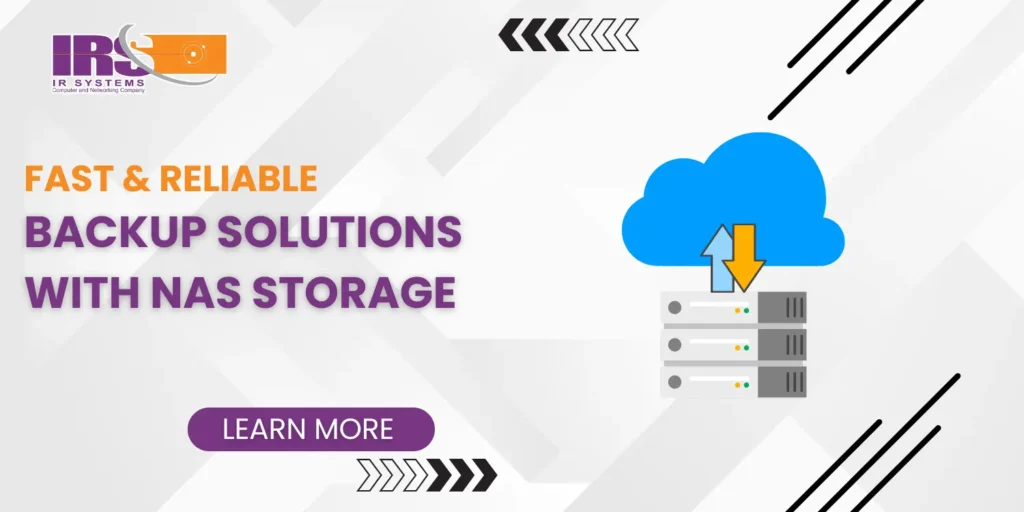
In a world where data is critical to operations, finding the fastest backup type is essential to keeping systems running smoothly. Whether you’re managing personal files or overseeing large-scale corporate data, quick and reliable backup solutions ensure your information is always safe and accessible. NAS storage offers a powerful solution with robust options for speed and security. This blog will explore different types of backup systems, explain the advantages of NAS storage, and highlight the importance of backup solutions . We’ll cover which types of backup are quickest and how they fit into various data needs, while also exploring the value of local services in enhancing data safety and efficiency. Understanding Backup Types: Which is the Fastest? To choose the fastest backup type, it’s essential to understand the primary options available: 1. Full Backup This backup type copies all selected data, providing the most complete backup. However, it can be time-consuming for large datasets, as every file is backed up each time. This method is best used sparingly, due to the considerable storage it requires. 2. Incremental Backup Incremental backups only save changes made since the last backup, making them significantly faster than full backups. They’re ideal for reducing backup time and storage, especially when frequent updates are necessary. 3. Differential Backup Similar to incremental backup, differential backups save changes since the last full backup. They are slightly slower than incremental backups but offer a balanced solution between speed and data restoration convenience. 4. Mirror Backup A mirror backup replicates your data in real-time, reflecting any changes or deletions instantly. While mirror backups are fast, they require constant management to prevent accidental data loss from unwanted changes. Among these, incremental backup generally offers the fastest speed and is preferred for frequent, low-impact updates. When implemented with NAS storage , incremental backups become a highly efficient option for businesses and individuals seeking rapid, secure data protection. Why Choose NAS Storage for Backup? NAS (Network-Attached Storage) is a versatile storage solution designed to provide centralized and accessible data storage over a network. NAS storage offers several key advantages: Speed and Accessibility: NAS systems enable quick access to files across multiple devices on the network, making it easy to back up data rapidly. This accessibility ensures files are always available and can be restored with minimal delay. Scalability: NAS devices are easy to expand as your storage needs grow, allowing you to add additional drives without complex configurations. This flexibility supports growing businesses and individuals with increasing data demands. Security: NAS devices offer advanced data encryption and user permissions, allowing secure data backup within a controlled environment. Security features are essential, especially when managing sensitive information in business settings. For businesses looking to optimize data management, NAS storage offers a powerful solution to centralize data and streamline backup processes. Exploring Backup Solutions: Every business’s growing demand for data storage solutions has led to the emergence of tailored backup solutions that cater to both individuals and businesses. Whether for personal use or corporate-level data management, these solutions provide the necessary support to protect and restore data quickly and effectively. Types of Backup Services Backup solutions offer a range of services: Cloud Backup Cloud-based solutions store data remotely, providing high accessibility and allowing users to retrieve data from any internet-enabled device. Cloud backup services are ideal for offsite data protection but may experience slower upload times based on internet speed. Local Backup For those who prefer offline backup solutions, local backup services use physical storage devices like external hard drives or NAS systems. Local backups ensure rapid access without internet dependency, making them a top choice for quick, onsite data recovery. Hybrid Backup Combining the best of cloud and local backup, hybrid solutions allow for data storage in both environments. This approach provides flexibility, enabling users to back up essential data onsite for speed while keeping less critical files on the cloud. Managed Backup Services Managed services provide expert oversight, handling the complete backup process, ensuring data integrity, and troubleshooting issues as they arise. These services are invaluable for businesses without dedicated IT staff to manage data backups in-house. Each of these options offers unique advantages depending on your specific requirements. For the fastest and most reliable solutions, backup solutions can provide customized services that fit individual and business needs. How NAS Storage Supports Fast and Reliable Backup Solutions Incorporating NAS storage into your backup strategy can significantly enhance speed and convenience. Here’s how: 1. Centralized Data Access With NAS storage, all data is stored in one accessible location, which reduces the time it takes to initiate backups across devices. This accessibility is especially beneficial for organizations with multiple users needing quick access to data. 2. Automatic Backup Scheduling NAS systems often come with scheduling capabilities, allowing backups to run automatically. This automation saves time, particularly with incremental backups, making it easy to maintain up-to-date copies without manual intervention. 3. Reduced Network Congestion By keeping backups localized within a network, NAS storage helps alleviate bandwidth constraints, ensuring that network resources remain free for other critical functions. For those seeking quick and efficient backup solutions, NAS storage is an excellent investment, offering not only speed but also the reliability needed for smooth data management. Benefits of Reliable Backup Solutions Opting for locally managed backup solutions offers several advantages: 1. Tailored Support Providers understand the unique needs of local businesses and individuals, offering tailored solutions and immediate assistance. 2. Improved Data Protection Local backup providers often offer enhanced security measures to protect data from threats specific to the region, ensuring information is safe from unauthorized access. 3. Cost-Effective Solutions Local services are often more affordable than international providers, making it easier for businesses to invest in reliable backup without excessive costs. 4. Faster Recovery Times By choosing backup solutions , you gain quick access to support and faster data recovery, ensuring minimum downtime for business operations. When combined with NAS storage , these backup solutions create a robust framework that prioritizes speed and reliability. FAQs What is
Understanding NAS Storage Lifespan and Durability Tips
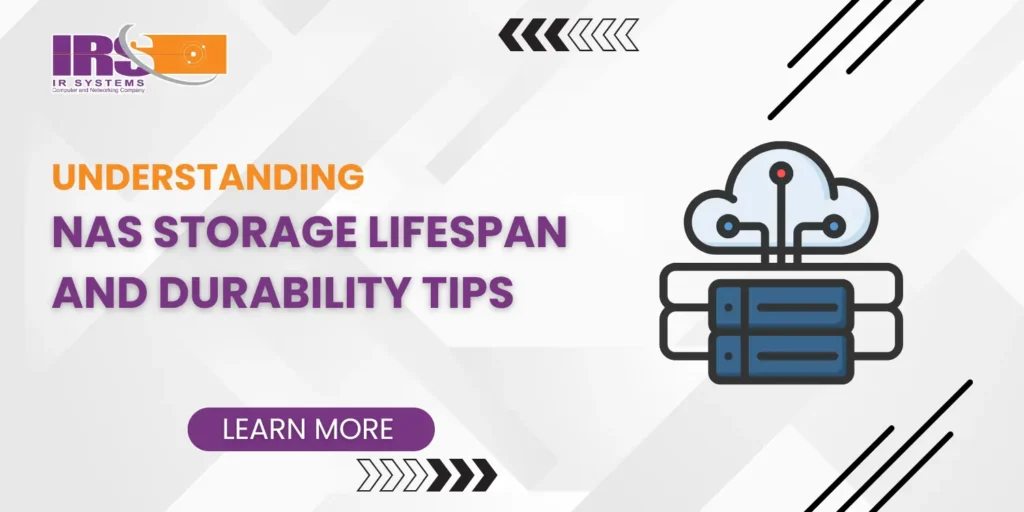
In today’s fast-paced digital world, businesses and individuals alike are constantly dealing with large volumes of data. Network-attached storage has become an ideal solution for securely storing, managing, and accessing this information. But one critical question often arises: how long can NAS storage last? In this guide, we’ll explore the longevity of NAS systems, factors affecting their lifespan, and the advantages of having a reliable backup solution. Network-attached storage (NAS) is a system that connects directly to your network, enabling multiple devices to access and share stored data. Unlike external hard drives, which serve individual devices, NAS server allows centralized storage accessible from any device on the network, making it ideal for businesses and homes that need shared storage solutions. Key Factors Affecting the Longevity of NAS Storage NAS systems are designed to last several years, but various factors can affect their lifespan. Here’s a closer look at the elements that determine how long your NAS server storage can serve you effectively: 1. Drive Quality and Durability NAS systems typically use hard drives (HDDs) or solid-state drives (SSDs), each with different lifespans. HDDs may last 3–5 years, while SSDs can reach up to 10 years. Investing in high-quality drives tailored for NAS applications is crucial for long-lasting performance. 2. Operational Environment NAS systems operate best in controlled environments. Excessive heat, dust, and humidity can significantly shorten the lifespan of NAS server storage. Ensuring proper ventilation and regular cleaning can help prolong the device’s durability. 3. Workload and Usage Patterns Heavily-used NAS systems tend to wear out faster. For businesses with high data transfer rates, it’s wise to invest in professional-grade NAS systems designed for heavy workloads. Regularly scheduled maintenance, such as monitoring and replacing aging drives, can further extend the lifespan of the system. 4. Power and Network Stability Frequent power surges or network interruptions can damage NAS hardware. Using uninterruptible power supplies (UPS) and stable networking equipment minimizes risks and helps the NAS system run reliably over time. 5. Firmware and Software Updates Regular software and firmware updates keep NAS systems optimized. These updates enhance security, reduce vulnerabilities, and often improve performance, all of which contribute to the overall longevity of the NAS system. Benefits of NAS Storage for Long-Term Data Management NAS offers an array of benefits, making it a preferred storage solution: Centralized Access: With NAS, all files are in one accessible location, streamlining data management for teams and individuals alike. Data Redundancy: Many NAS systems have built-in redundancy, such as RAID (Redundant Array of Independent Disks), ensuring data remains safe even if one drive fails. Scalability: NAS systems are often scalable, allowing users to add more drives as storage needs grow. Remote Access: Network-attached storage enables secure access to data from anywhere, ideal for remote work setups and field teams. Exploring Backup Solutions: Safeguarding Your NAS Data Backup solutions are essential for data integrity and protection. Although NAS systems provide redundancy, a separate backup solution is vital in case of catastrophic failures. Backup Solutions typically offer cloud backup or physical storage options. Here’s why these solutions are essential: Data Security: With backup solutions, sensitive data remains secure even if the NAS system faces hardware issues. Disaster Recovery: In the event of data loss due to unforeseen circumstances, a backup solution ensures quick recovery, minimizing operational downtime. Scalability: Backup solutions are highly scalable, growing alongside your data requirements. Using a robust backup system alongside NAS adds an additional layer of security and can significantly extend the usefulness of your NAS setup. How NAS and Backup Solutions Complement Each Other While NAS provides reliable and centralized storage, backup solutions ensure that data stored on NAS devices is further protected. Integrating NAS storage with backup solutions can help you achieve: Improved Data Redundancy: Both NAS and backup systems have redundancy mechanisms, creating a safety net for stored data. Flexible Access: With network-attached storage, data is readily available, while backup solutions can secure copies in the cloud or in separate locations for enhanced data recovery options. Tips to Extend the Life of Your NAS Storage By following best practices, you can maximize the longevity of your NAS storage: Schedule Regular Maintenance: Periodic checks on drive health and firmware updates can prevent issues before they occur. Ensure Proper Ventilation: Place your NAS in a cool, well-ventilated area to avoid overheating. Use Quality Drives: Opt for enterprise-grade drives designed for NAS, as they’re built to handle consistent workloads. Invest in a UPS: Power interruptions can damage drives. A UPS stabilizes power, offering an uninterrupted experience and protecting the NAS from sudden shutdowns. FAQs Q1: How long does NAS storage generally last? A NAS system can last anywhere from 3 to 10 years, depending on drive quality, environmental factors, and maintenance practices. Q2: Can NAS storage replace traditional backup solutions? NAS storage can supplement backup solutions but should not replace them entirely. Having both NAS storage and backup solutions ensures maximum data protection. Q3: What is the difference between NAS and Backup Solutions in Lahore? NAS serves as a centralized storage for daily data access, while Backup Solutions in Lahore provide secondary storage, focusing on data recovery and redundancy. Q4: Can you upgrade the drives in your NAS storage? Yes, most NAS systems support drive upgrades, allowing you to replace aging or under performing drives as needed. Q5: What is the primary purpose of a NAS server? A NAS server’s primary purpose is to offer centralized data storage, accessible from multiple devices within a network, enhancing productivity and data management. Final Thoughts: Invest in Reliable NAS Storage with IR Systems Network-attached storage is an excellent investment for any business or individual with growing data needs. With proper care, maintenance, and a complementary backup solution, NAS storage can serve your data requirements for years to come. At IR Systems, we offer a range of high-quality NAS storage solutions that ensure secure, long-lasting, and scalable storage. Explore our website and take the first step towards reliable data management.
QNAP NAS Storage and Backup Solutions
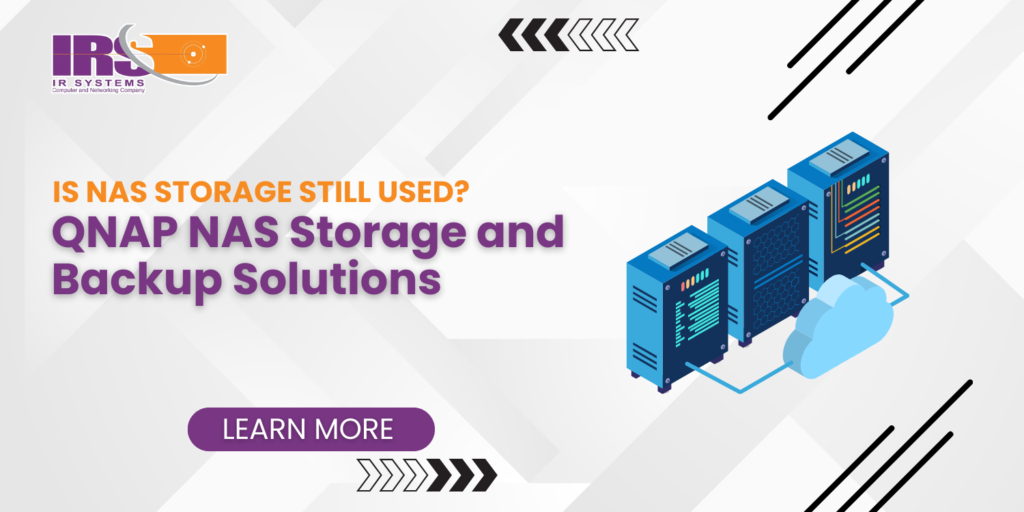
In today’s digital age, data storage needs are more critical than ever. Businesses and individuals alike rely on efficient, secure, and scalable storage solutions to safeguard their data. One popular storage solution that remains widely used is NAS storage, especially QNAP NAS storage. But with the evolution of cloud storage and advanced data management systems, one might wonder: Is NAS storage still used? This article explores the advantages of NAS storage, highlights the features of QNAP NAS system, and discusses backup solutions for businesses and individuals. What is NAS Storage? NAS (Network-Attached Storage), is a dedicated file storage system that allows multiple users and devices to access data from a centralized, network-connected location. NAS storage solutions provide easy access to data, scalability, and high-level security, making them ideal for business environments. Why is NAS Storage Still Relevant? Despite the rise of cloud-based solutions, NAS storage remains highly relevant due to its cost-effectiveness, data privacy, and control over data access. Here are a few key reasons why NAS storage is still widely used: Data Privacy and Control: With NAS storage, data remains under the organization’s control without relying on third-party providers. This ensures data privacy and meets security requirements for sensitive information. Scalability: NAS storage solutions, such as QNAP NAS servers, allow organizations to expand their storage capacity as their data needs grow, making them suitable for long-term use. Accessibility and Efficiency: NAS storage offers high-speed access to data on the local network, making it ideal for teams that need to access large files or databases without delays. The Role of QNAP NAS Storage QNAP NAS system is a leader in the NAS storage market, offering robust solutions for businesses and individuals who need reliable data storage and access. QNAP NAS servers are designed with advanced features that support efficient data management, backup, and sharing. Let’s explore some of the key benefits of using QNAP NAS storage. Key Benefits of QNAP NAS Storage High Performance and Reliability: QNAP NAS servers are built for high performance, providing stable and fast access to data across multiple devices. Data Security and Encryption: QNAP NAS offers various security features, including encryption, to protect data from unauthorized access, ensuring business continuity. Efficient Backup Solutions: With QNAP NAS, users can easily implement backup strategies to secure their data. This is especially valuable for businesses seeking reliable backup solutions. App Integration and Flexibility: QNAP NAS servers support various applications, making them versatile for different storage needs, whether for media streaming, file sharing, or cloud backup. User-Friendly Management: QNAP’s interface is designed to be intuitive, allowing users to manage storage, access data, and configure settings without specialized IT knowledge. Why Use QNAP NAS Storage for Backup Solutions? For organizations and individuals, data security and accessibility are crucial. Backup solutions must be dependable, secure, and efficient, making QNAP NAS storage an ideal choice. Here’s how QNAP NAS system aligns with effective backup practices: Local and Remote Backup Options: QNAP NAS storage allows users to set up both local and remote backups, ensuring data remains protected against physical damage or cyber threats. Automated Backup Scheduling: Users can schedule backups at regular intervals, reducing the risk of data loss due to forgotten or inconsistent manual backups. Seamless Data Recovery: QNAP NAS provides fast data recovery options, enabling businesses to minimize downtime in case of data loss. Cost-Effectiveness: Compared to cloud-based backup services, QNAP NAS system offers a cost-effective backup solution, as users have direct control over their data without recurring subscription costs. Features of QNAP NAS Server QNAP NAS servers come packed with features that make them an excellent choice for organizations looking for robust and scalable storage. Here are some of the top features: File Sharing and Synchronization: QNAP NAS supports cross-platform file sharing, allowing users to access and sync files across different devices, enhancing collaboration within teams. Flexible Storage Management: With support for RAID configurations, QNAP NAS ensures data protection and optimal storage utilization. Virtualization and Cloud Backup: QNAP NAS servers support virtualization, allowing businesses to create virtual machines on the server itself. They also offer cloud backup options, ensuring that data can be backed up to a cloud service if required. Multimedia Management: QNAP NAS storage is designed to handle multimedia files efficiently, making it popular for creative professionals who need a secure space to store and edit large files. How Backup Solutions Can Benefit from QNAP NAS Storage Reliable backup solutions are essential for businesses to protect their valuable data from cyber threats, hardware failures, and accidental deletions. QNAP NAS system provides a robust foundation for backup solutions by offering: Enhanced Data Security: QNAP NAS servers include advanced security protocols, ensuring that sensitive information remains protected. High Availability: QNAP NAS system offers high availability, meaning data is always accessible when needed. This is crucial for businesses that need to maintain uptime. Cost Savings: With QNAP NAS, businesses can set up efficient backup systems without the ongoing costs associated with cloud storage. Control and Flexibility: Unlike cloud storage, NAS storage provides complete control over data, including how and when backups are conducted. This flexibility is valuable for organizations looking for tailored backup solutions. When to Choose NAS Storage Over Cloud Storage While both NAS and cloud storage have their advantages, NAS storage is often the better option for organizations that require: Complete Control Over Data: For companies dealing with sensitive information, NAS storage ensures full control over data without relying on external providers. High-Speed Data Access: NAS storage provides fast, local network access to data, ideal for teams working with large files. Reduced Long-Term Costs: NAS storage can be more cost-effective than cloud solutions, especially for long-term data storage and management needs. How IR SYSTEM Can Support Your NAS and Backup Needs At IR System, we understand the importance of reliable data storage and backup solutions for businesses and individuals. Our team specializes in QNAP NAS system and backup solutions, providing tailored services to meet our clients’ unique needs. Whether you’re looking to set up a secure storage
